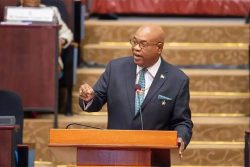BRASILIA, (Reuters) – The Brazilian government sought to appease the country’s powerful farm lobby yesterday by broadening the decision-making process used to designate land for Indian reservations, following controversial expropriations.
President Dilma Rousseff’s chief of staff Gleisi Hoffmann told angry congressmen from agricultural states that more government agencies will have a say in land decisions that have been the exclusive purview of the Indian affairs office FUNAI.
FUNAI is responsible for protecting Brazil’s 800,000 indigenous people and has expanded reservations to some 13 percent of the country’s massive territory, even though Indians account for only 0.4 percent of the population.
Clashes with farmers have intensified since Brazil became a top world food producer and the agricultural frontier advanced into traditional Indian areas where soy fields and cattle ranches now overlap with land claimed by indigenous tribes.
Hoffmann said respected agricultural research institute Embrapa will have a role in determining whether disputed areas are ancestral Indian lands or have been farmed for decades. The agriculture and environment ministries will have input, as well as agencies involved in infrastructure investments, she said.
“We need to listen to other voices and get information needed for qualified decisions,” she said at a noisy hearing of the Agriculture Committee of the lower chamber of Congress.
Embrapa has already provided a study of land usage in her home state of Parana and has been asked to do the same for Mato Grosso do Sul, Rio Grande do Sul and Santa Catarina, she said.
Farmers crowding the hearing room booed the minister when she defended FUNAI’s role in protecting Brazil’s natives.
A group of Indians wearing straw skirts and painted faces rattled maracas, and then walked out in protest over the farm lobby’s proposal to give Congress the last word on FUNAI’s decisions on reservation boundaries.








